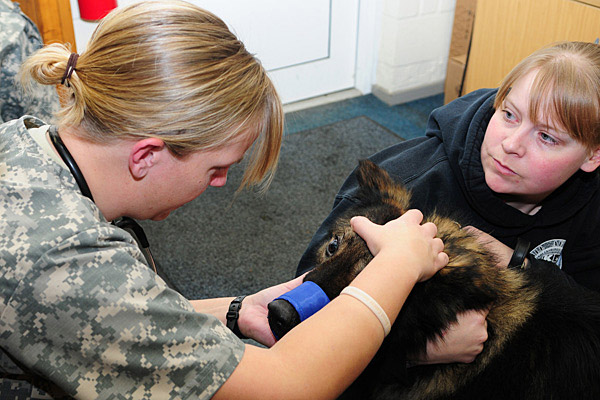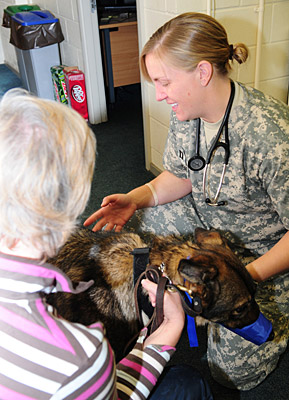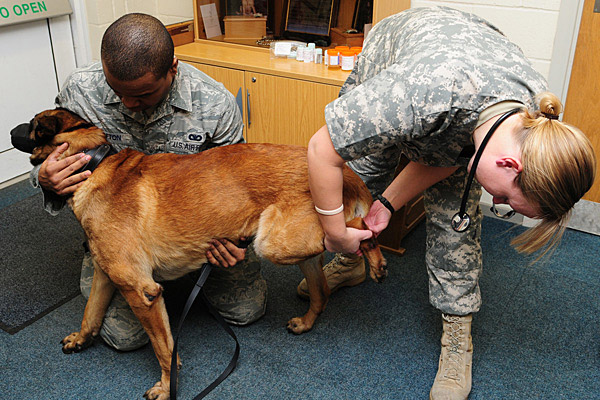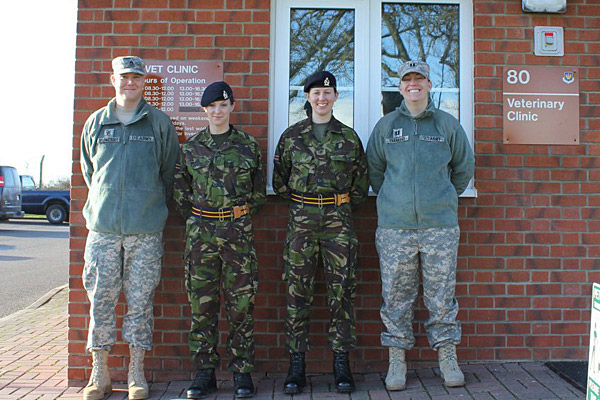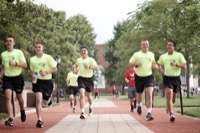Military veterinarian
Diamond combines military background with veterinary passion
1:09 p.m., Feb. 8, 2012--Growing up in a military family, University of Delaware graduate Danielle Diamond always told her parents -- specifically her father, who had a career in the Navy -- that she would join ROTC if it weren’t for her love of animals and her interest in veterinary medicine. Now, as she serves as a military veterinarian stationed in England, Diamond gets to experience the best of both worlds.
Diamond, who graduated from UD's College of Agriculture and Natural Resources in 2005, said she was first made aware of the opportunity to combine the two fields through the Army Health Professions Scholarship Program, which she discovered while attending the Cummings School of Veterinary Medicine at Tufts University.
People Stories
'Resilience Engineering'
Reviresco June run
She said that the program is “a bit like the ROTC program. I received a two-year scholarship and owed back three years of active duty service once I graduated. I completed vet school, was commissioned as a captain in the United States Army and pretty much put a uniform on for the first time on June 1, 2009.”
Diamond is now serving as the officer in charge of the veterinary treatment facility at the Royal Air Force (RAF) Feltwell facility, and she explained that there are many facets to her job as a veterinarian in the military.
“Our primary concern is the military working dogs. I oversee two kennels here with roughly 20 dogs. We provide their routine and emergency care,” said Diamond, explaining that she also examines the animals that are owned by military personnel or retirees, administering preventive medicines to the animals -- such as vaccines, flea and tick control -- and spaying and neutering the animals.
Though her main focus is the military working dogs, Diamond helps out with food audits, as well, making sure the food and water that is distributed to the military base is safe to consume. She also works closely with the public health department to manage potential rabies cases, although she notes that the United Kingdom is considered “rabies-free.”
Because she works at “the only veterinary treatment facility in the U.K. for military members” other than pricey private practices, Diamond explained that she makes quarterly trips to three neighboring military bases to look at their animals. She and her staff also go to child development centers to monitor the health of their pets, and volunteer with scouting and school-age groups to “expand animal awareness and provide education.”
Of all her duties, Diamond said that working with the military working dogs is her favorite part of the job. “Those dogs are at the top of my priority list, 24/7. When anything happens with one of those dogs, from vaccines to an emergency surgery, I’m the one who will be called in to handle it.”
Keeping the dogs in top physical form is key to their success, as Diamond explains that if a dog is sick or misses a routine veterinarian appointment, that dog is not going to work out as well or could even “miss out on the opportunity to deploy.”
Diamond said that watching the dogs work together as a team is “an awesome thing. It’s especially rewarding when you see some of these young enlisted folks come in and take responsibility for their dog and work out the kinks in their performance. Those dogs and their handlers save lives, and I want those dogs that are patrolling for drugs or explosives to be at their best physical being in order to keep our American military members safe at all times.”
In the end, Diamond says that what matters most to her is making sure that her patients stay healthy and alert. “It doesn’t matter if that dog’s job is making a small, safe base even safer or joining a Navy SEAL team to take down a bad guy like Osama Bin Laden -- I want to be able to say I did the best job at keeping that dog healthy and capable of doing a great job.”
Time at UD
Before she even realized that she could combine her military background with her interest in veterinary medicine, Diamond was an undergraduate in UD's College of Agriculture and Natural Resources.
Diamond graduated from UD in 2005, with a bachelor of science degree in animal science, and a concentration in pre-veterinary medicine and minors in wildlife conservation and biological sciences.
Diamond was an active Ag Ambassador, a program with which she wanted to get involved after being shown around the campus by an ambassador when she visited UD as a high school student.
“When I came and interviewed at UD, I spent a day there with an Ag Ambassador and I got to go to some classes and spend some time out on the farm, and that kind of sealed the deal for me when I was going to visit schools, because it was such an interpersonal relationship and I really got to see the school and talk to somebody one on one,” Diamond said.
She added that once she became an Ag Ambassador, she was heavily involved with the program, “I did a lot of events when I was there. I think we had to do four events a semester and I think I did about 75 by the time I graduated.”
Besides the fond memories of working with Karen Aniunas, director in University Development and an instructor in CANR, and the Ag Ambassadors, Diamond recalls fondly traveling to New Zealand during a Winter Session study abroad trip with Lesa Griffiths, professor in the Department of Animal and Food Sciences, and working with Limin Kung, professor of animal and food sciences, in the Ruminant Nutrition Lab. “Dr. Kung took me on for a research lab position to earn some extra money, linked me up to a local large animal veterinarian to gain experience, and ultimately became my adviser and a good friend.”
She encourages current UD students to go out and get involved in both the campus and the community. “There are a ton of opportunities both on the campus as well as at your fingertips, as Delaware is a very agricultural state,” Diamond said. “It will benefit you, your school, and the community.”
Diamond does have one regret, however, and that is graduating before the UDairy Creamery opened for business.
“I just want to make it known that I’m a bitter alumni in that the UD Creamery opened after I had graduated!” Diamond joked, adding that she made the mistake of one day perusing the UDairy Creamery menu on the website and longed for a taste. “Guess I need to plan a visit back…”
Article by Adam Thomas






